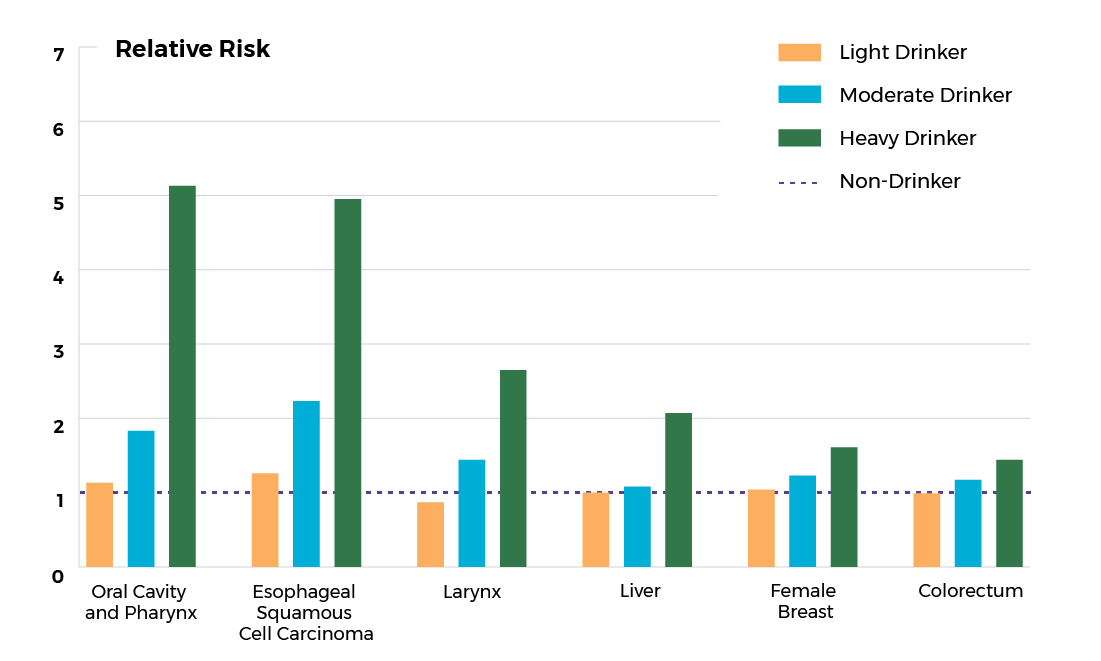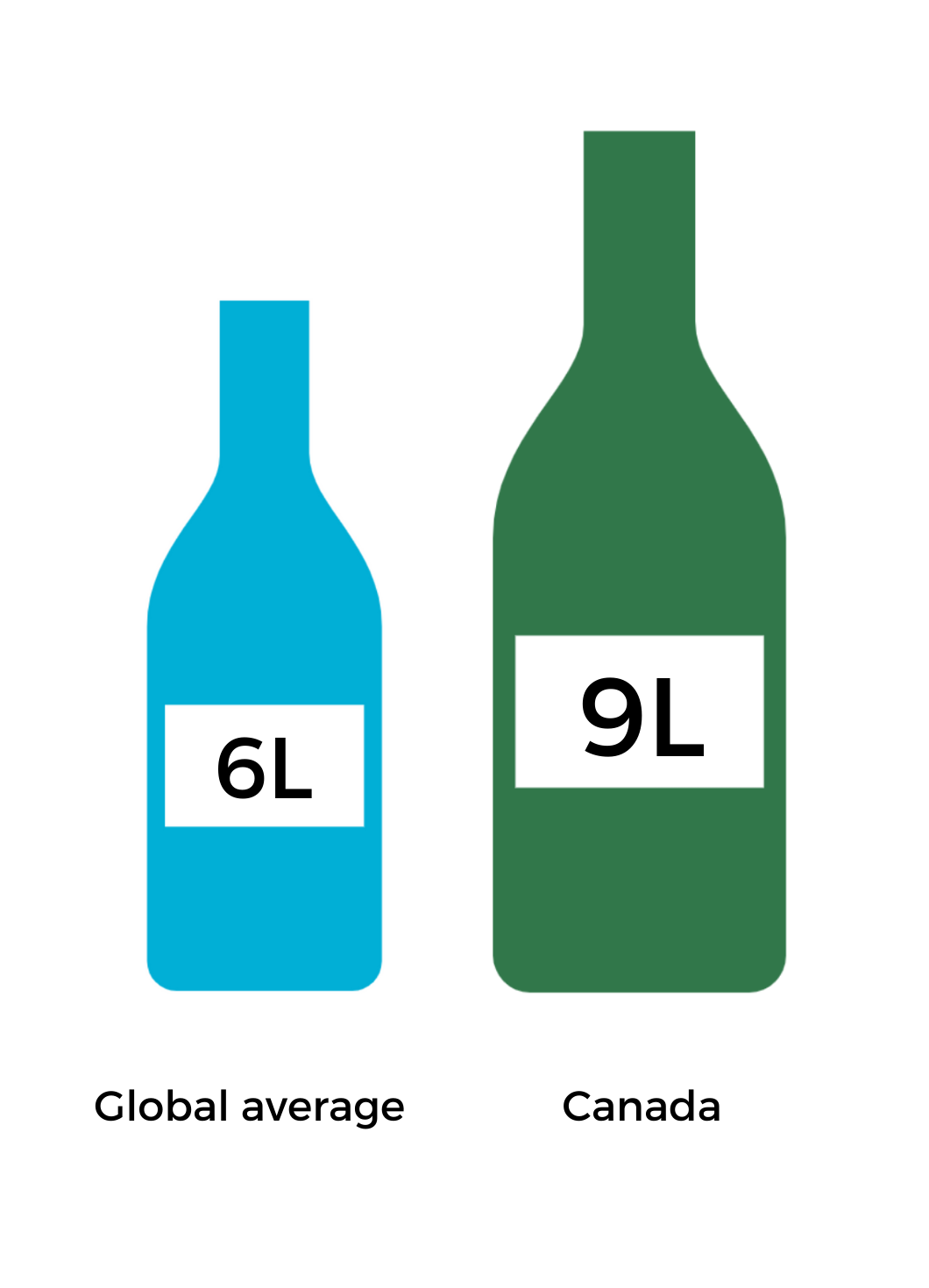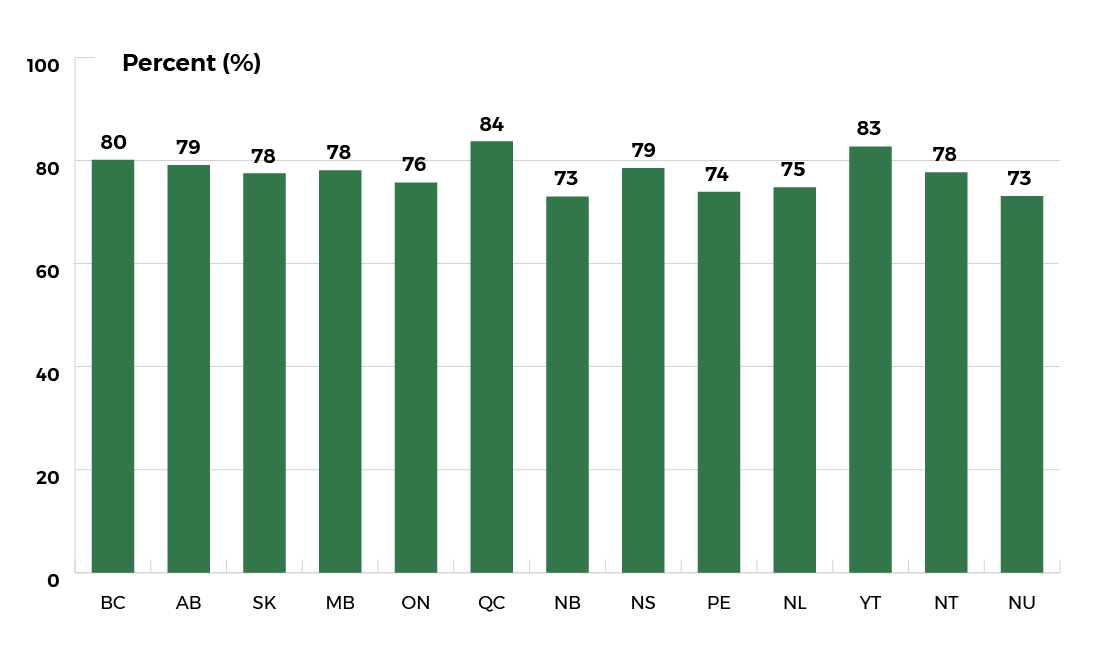Alcohol policies
Background and key statistics on alcohol consumption and cancer
Alcohol and cancer
- Alcohol is one of the top three causes of cancer deaths globally.1
- Alcohol is linked to at least seven types of cancer and nearly 7,000 annual cancer deaths in Canada.2
- Alcohol is linked to several cancers including oropharynx, larynx, esophagus, liver, breast, colon, rectum, pancreas, lung, and prostate.3
- Risk increases when alcohol is combined with tobacco use, unhealthy eating, and lack of physical activity.4
Relative risks by cancer type and alcohol intake (drinks per day)
Cancer risk increases among heavy and moderate drinkers; but even light drinkers are at risk.5

Alcohol consumption in Canada
- Nearly 80% of Canadians 15 years and over consume alcohol up to 9 litres per capita per year compared to the global average of 6 litres.6
- Alcohol consumption patterns depend on jurisdiction, sex, age, sexual orientation, socioeconomic status, and Indigeneity.
- To reduce the risk of cancer, it is best not to drink alcohol at all. A limit of two standard drinks a week is recommended for those who choose to drink.7
- Different low-risk drinking guidelines exist:
- The World Cancer Research Fund recommends abstinence.8
- The Canadian Cancer Society states: Limit alcohol. To reduce your cancer risk, it’s best not to drink alcohol. Canada’s Guidance on Alcohol and Health outlines the health risks of alcohol and can help you make an informed decision on whether you drink and how much.If you choose to drink alcohol, keep your cancer risk as low as possible by having no more than 2 standard drinks a week. The less alcohol you drink, the lower your cancer risk.9
- In 2023, the Canadian Centre on Substance Use and Addiction replaced Canada’s Low Risk Alcohol Drinking Guidelines with Canada’s Guidance on Alcohol and Health. The new guidance specifies the health risks, including cancer, associated with alcohol and supports the public in making informed decisions about alcohol consumption. The guidance features a risk continuum based on gender and frequency of daily alcohol intake. To reduce the risk of cancer, it advises not drinking alcohol at all. A limit of two standard drinks a week is recommended for those who choose to drink.10

Percentage of Canadians (aged 18+) who reported drinking in the past year, by jurisdiction – 2019
Between 73% and 84% of people in Canada reported drinking in the past year.

Public perceptions of alcohol and cancer
Most Canadians are not aware that alcohol can cause cancer. The more informed the public is, the more they support alcohol policies.
- Heavy drinkers typically oppose alcohol policies, especially those that limit access and availability.
- Public health education is needed to communicate risks and support implementation of alcohol policies.
- Strong health messages, including warning labels, can shift drinking behaviours.11
McMaster Health Forum
In partnership with McMaster Health Forum, the Partnership commissioned a rapid synthesis on examining the costs and cost-effectiveness of policies for reducing alcohol consumption. This research informed this report on policy actions.
1National Cancer Institute at the National Institutes of Health. 2018. Alcohol and cancer risk (fact sheet). Cited 28 January 2021. Available from: https://www.cancer.gov/about-cancer/causes-prevention/risk/alcohol/alcohol-fact-sheet; World Cancer Research Fund. 2018. Alcoholic drinks and the risk of cancer. Cited 28 January 2021. Available from: https://www.wcrf.org/sites/default/files/Alcoholic-Drinks.pdf.
2Canadian Centre on Substance Use and Addiction. Update of Canada’s Low-Risk Alcohol Drinking Guidelines: Final Report for Public Consultation [report]. 2022. Available at:
https://ccsa.ca/update-canadas-low-risk-alcohol-drinking-guidelines-final-report-public-consultation-report
3Connor J. Alcohol consumption as a cause of cancer. Addiction. 2016;112(2):222-228
4Alcohol and Cancer Risk Fact Sheet. 2018. Cited 28 January 2021. Available from: https://www.cancer.gov/about-cancer/causesprevention/risk/alcohol/alcohol-fact-sheet.
5Bagnardi V, Rota M, Botteri E, Tramacere I, Islami F, Fedirko V, Scotti L, Jenab M, Turati F, Pasquali E, Pelucchi C, Galeone C, Bellocco R, Negri E, Corrao G, Boffetta P, La Vecchia C. Alcohol consumption and sitespecific cancer risk: a comprehensive dose-response meta-analysis. Br J Cancer. 2015 Feb 3;112(3):580- 93. doi: 10.1038/bjc.2014.579. Epub 2014 Nov 25.
6Hannah Ritchie and Max Roser. 2018. Alcohol Consumption. Available from: https://ourworldindata.org/alcohol-consumption
7Canadian Centre on Substance Use and Addiction. Update of Canada’s Low-Risk Alcohol Drinking Guidelines: Final Report for Public Consultation [report]. 2022. Available at:
https://ccsa.ca/update-canadas-low-risk-alcohol-drinking-guidelines-final-report-public-consultation-report
8Limit alcohol consumption. World Cancer Research Fund. Cited 28 January 2021. Available from: https://www.wcrf.org/dietandcancer/recommendations/limit-alcohol-consumption.
9CCSA Alcohol Project. Available at: https://www.ccsa.ca/lrdg-project-2022
10Ibid.
11Weerasinghe A, Schoueri-Mychasiw N, Vallance K, Stockwell T, Hammond D, McGavock J et al. Improving Knowledge that Alcohol Can Cause Cancer is Associated with Consumer Support for Alcohol Policies: Findings from a Real-World Alcohol Labelling Study. International Journal of Environmental Research and Public Health. 2020;17(2):398.
